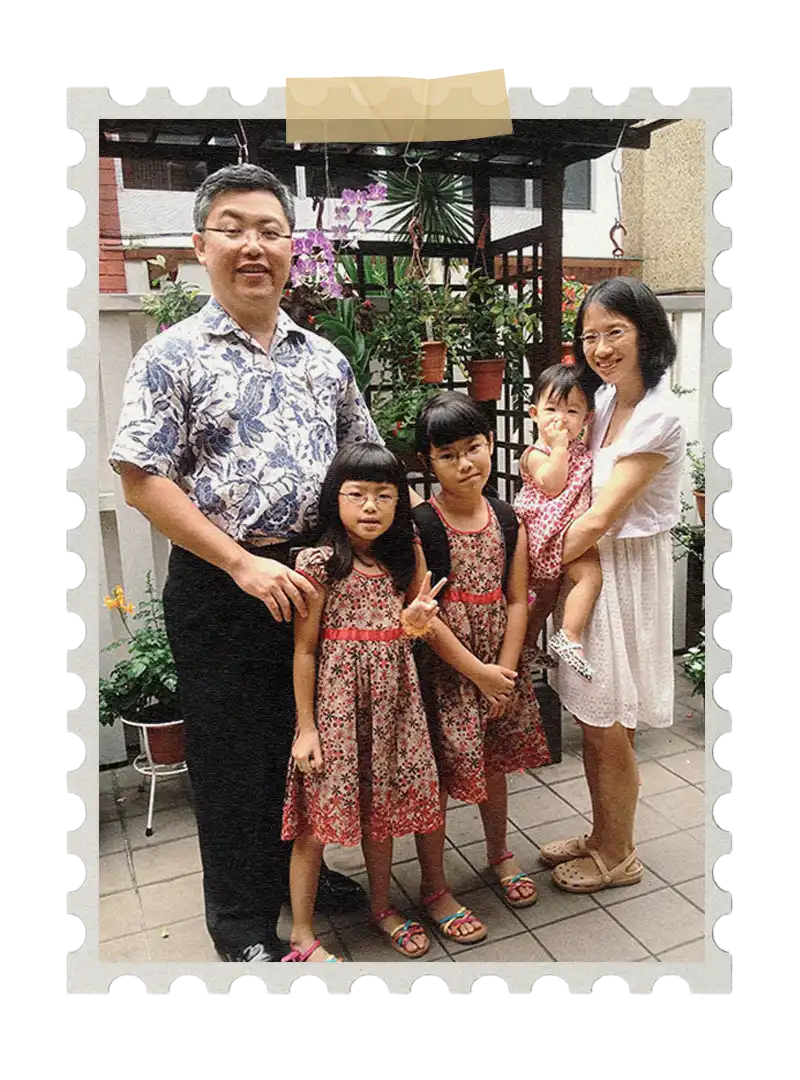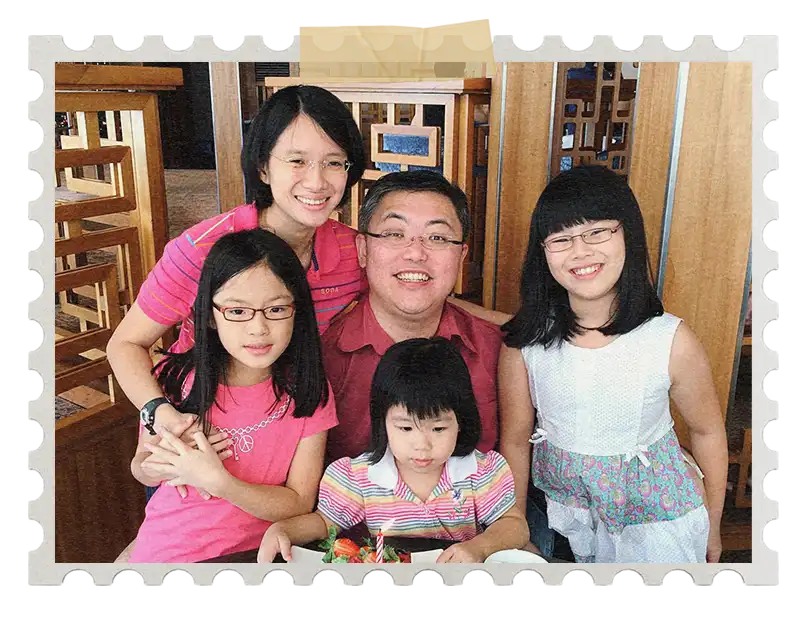
Growing up in the 1980s, Dr. Joseph Leong was a latchkey kid who hardly saw his parents at home. His mother was a teacher, while his father worked as a chef.
“My dad was very busy and hot-headed, maybe because he spent his whole day in the hot kitchen,” says Joseph.
“When he returned home I think he felt ignored by us and that nobody cared about him. Combined with his hunger, anger, and tiredness, he ended up shouting at us and sometimes hitting us.”
Because of his father’s temper, his parents often quarrelled. One day, his mother threatened to leave home. That was when Joseph, the eldest of three, decided to do something.
“I knew I had to talk to my dad. I also began to try meeting his needs—when he came home, I’d offer him food or drinks and make small talk with him,” recounts Joseph. “There was once I even washed his feet. And that really calmed him down.”
Joseph’s acts of care and service led to a change in his relationship with his father, who began to mellow.
“In that sense, my father became my first ‘client’,” quips Joseph, a veteran psychiatrist of over 25 years.
Tracing Mental Health Issues to Childhood
Before going into private practice in 2022, Joseph worked at the Institute of Mental Health as a psychiatrist for over two decades. In public healthcare, Joseph saw thousands of patients every year, many of whom were adolescents.
The most common mental health issues they faced were linked to anxiety and behavioural disturbances. Others included separation anxiety, suicidal tendences, and gender dysphoria.
“Much of this can be traced back to a person’s childhood experiences,” says Joseph, who is now senior consultant at psychiatric clinic Promises Healthcare, as well as president of the Association for Psychiatric Rehabilitation.
“The way parents relate to children shapes the things they believe about themselves and their ability to trust others in the years ahead.”
“From the ages of zero to seven,” he adds, “the role played by parents and caregivers is monumental—whether they were present or absent, whether they calmed and comforted the children in times of distress or criticised, yelled, or ignored them.
“The way parents relate to children shapes the things they believe about themselves and their ability to trust others in the years ahead,” he says.
Mental Health in Teenhood and Beyond
“When children are aged between 7 to 14, they become more independent,” Joseph observes. “That’s when classmates, friends, and teachers play a larger influence.”
This season in a child’s life can also be marked by issues such as bullying and body image, which can create anxiety and insecurity in the child’s psyche.
“When kids face these sorts of issues, they may not say it out loud,” Joseph observes, “so it can manifest in ways like refusing to go to school, becoming addicted to social media, or even having suicidal tendencies.”
“Humans are social beings who always want acceptance. At this point our teens are looking for friends who accept them.”
“Likewise, the ages of 14 to 21 are marked by an increasing independence from parents as well as an increasing desire to belong socially,” says Joseph.
“Humans are social beings who always want acceptance. At this point our teens are looking for friends who accept them. And if left without guidance, they might experiment with alcohol, smoking, vaping, or sex,” he adds.
Recently, Joseph has spotted another worrying trend: teens turning to social media and AI chatbots for mental health support. While useful at times, Joseph warns that AI tools may misdiagnose or amplify their struggles.
For these reasons, it’s all the more important that parents create a safe home environment for their children where their physical and emotional needs are met, and where they feel they belong and are loved.
“Only Jesus Will Never Fail You”
Knowing all this as a psychiatrist meant that when Joseph first became a father, he and his wife Sandra tried to do all they could to help their children feel safe and loved.
One way they did this was by focusing on their marriage, particularly when it came to conflict resolution.
“It’s normal for couples to fight, but the key is whether they resolve their conflicts in front of their children,” says Joseph. “We didn’t want our children to live in the fear and uncertainty that comes with parents who are abusive to each other or to them, physically or verbally.”
Modelling conflict resolution and good communication also teaches children how they can do the same in their own friendships and relationships in the future, he adds.

Besides focusing on their marriage, Joseph and Sandra sought to impress upon their three daughters—Grace, Joy, and Faith—a love for God and knowledge of His presence. As his girls were growing up, every night without fail, Joseph would tell them: “Jesus loves you.”
He recalls an episode when one daughter asked Joseph and Sandra if this meant that they didn’t love her. He told her: “It’s not that we don’t love you, but that there will be times when we fall short as parents.
“We are not perfect. Only Jesus will keep His promises and never fail you.”

On weeknights, the family would gather for devotions using a short children’s devotional and for prayer. On weekends, they would share prayer requests and the ways they encountered God in the past week.
Joseph, Sandra, and their daughters have continued these nightly devotions even till today—with Grace and Joy—who are twins—now 21 years old, and Faith 14.
Every month, we roll out a new resource for families. Subscribe to our email updates, and be the first to get a copy!
Entering Our Children’s Social World
Joseph’s goal as a father is to ensure that his daughters always feel safe with him, he says.
“Now that they’re in their teens and early twenties, I always tell them that if they go out with their friends—and if for whatever reason they feel unsafe or uncomfortable—they are to call me and I will come and get them, no questions asked,” he shares.

Joseph and Sandra also regularly chat with their daughters about their friends and daily interactions, with Sandra praying regularly that their daughters would make friends who share godly values. Cultivating a godly and stable environment for them was one reason why she decided to become a full-time homemaker after their twins turned five.
Besides this, the couple tries to get to know their daughters’ friends personally. On many occasions, Sandra has hosted meals and “watch parties” for them.
By entering their daughters’ social world, Joseph and Sandra look for opportunities to affirm them when they do the right thing, and gently guide them by speaking the truth in love when they go the wrong way (see Ephesians 4:15).
Leaning On and Learning from Our Father
One challenge Joseph faced as a new father was that he had little firsthand experience of positive role models to draw on.
But one verse that has encouraged him is 1 John 4:19: “We love because [God] first loved us.” Experiencing the tangible love of God the Father, Joseph says, has enabled and taught him to extend the same love to his children.
“While secular psychology looks at the role of parents, beyond that, as Christians we can draw on the Holy Spirit’s empowerment to help us.”
Joseph has been helped by parenting resources and events offered by organisations such as Focus on the Family and the Centre for Fathering, which spearheads the national Dads for Life Movement.

Joseph is also involved in Christian fathering groups that meet to pray and encourage one another.
“While secular psychology looks at the role of parents, beyond that, as Christians we can draw on the Holy Spirit’s empowerment to help us (Ephesians 3:16) when we don’t know how to raise our kids,” says Joseph.
How God Wants Us to Use Our Time
As a working father, Joseph empathises with parents who feel too exhausted to invest more time and energy into discipling their children intentionally.
But he has a word of gentle caution for them: “Every parent is tired. But when we come face to face with Jesus and have to account for how we raised our children, what will we say?
“Many parents work hard to provide for their children’s material needs, but how about their emotional and spiritual needs?”
Joseph, too, struggled in juggling his roles at work, home, and church. Over the past two decades, he experienced burnout nine times. “There were so many times I wanted to quit and run away,” he says.
Each burnout, however, led Joseph to a personal encounter with God, giving him a fresh understanding and perspective on Him as holy, alive, and majestic.
They also taught him to better manage his time and priorities as he looked to God for strength and wisdom. “Each time, God restored and renewed me like He did for Elijah—giving him rest, food and drink, and speaking gently to him (1 Kings 19),” Joseph testifies.
“Every parent is tired. But when we come face to face with Jesus and have to account for how we raised our children, what will we say?”
As such, tired parents may need to reassess their roles and responsibilities, and the way they respond to daily demands, says Joseph. “It’s also important to ask God’s Holy Spirit to lead and guide us as we walk in step with Him.”

One thing Joseph personally felt convicted to do in recent years was to prioritise taking leave on his daughters’ birthdays to spend dedicated time with them. “In the past I often had to forego or burn my annual leave because of how busy I was at work,” he confesses.
These days, he tells his daughters: “If you’re free on your birthday, I would love to spend time with you. Or I can run errands for you—whatever you need, just let me know. If you’re not free it’s OK too, Daddy will spend the day praying for you and thanking God for you.”
Eating “Daily Bread” Starts with Us
One thing Joseph finds helpful to remember is the “triangle” of family life, with the triune God as head over his marriage, parenting, and work.
“If we acknowledge that God is sovereign over our marriage and parenting, then it means we look to Him for the wisdom, grace, and strength we need in our roles as husband or wife, father or mother,” says Joseph.
This means that as children of God ourselves, we too ought to draw near to Him by frequently feeding on His “daily bread”—His living Word (Matthew 4:4; Luke 4:4).
It is only when we do this—and persist with it through the long and hard years of parenting—that we can encounter God for ourselves and introduce Him to our children in a manner that is authentic, Joseph says.
“As parents, we must always ask ourselves: Do we know—really know—Jesus for ourselves? Or is He just a Sunday school story we tell our children without really believing in Him?”
“If we acknowledge that God is sovereign over our marriage and parenting, then it means we look to Him for the wisdom, grace, and strength we need.”

One passage that resonates with Joseph is Malachi 4:5–6, which describes a time when God would “turn the hearts of the parents to their children, and the hearts of the children to their parents” (v. 6), as they repent and reconcile with God the Father.
Joseph hopes that as parents and children turn their hearts towards God, they would also experience a turning of hearts towards each other.
“Let us trust God with our children’s struggles, point them to Jesus, and invite God’s presence in their lives,” he says.
“And let us never forget to pray for our own relationship with God, pray together with our spouse for our marriage, and pray together as a family.”




